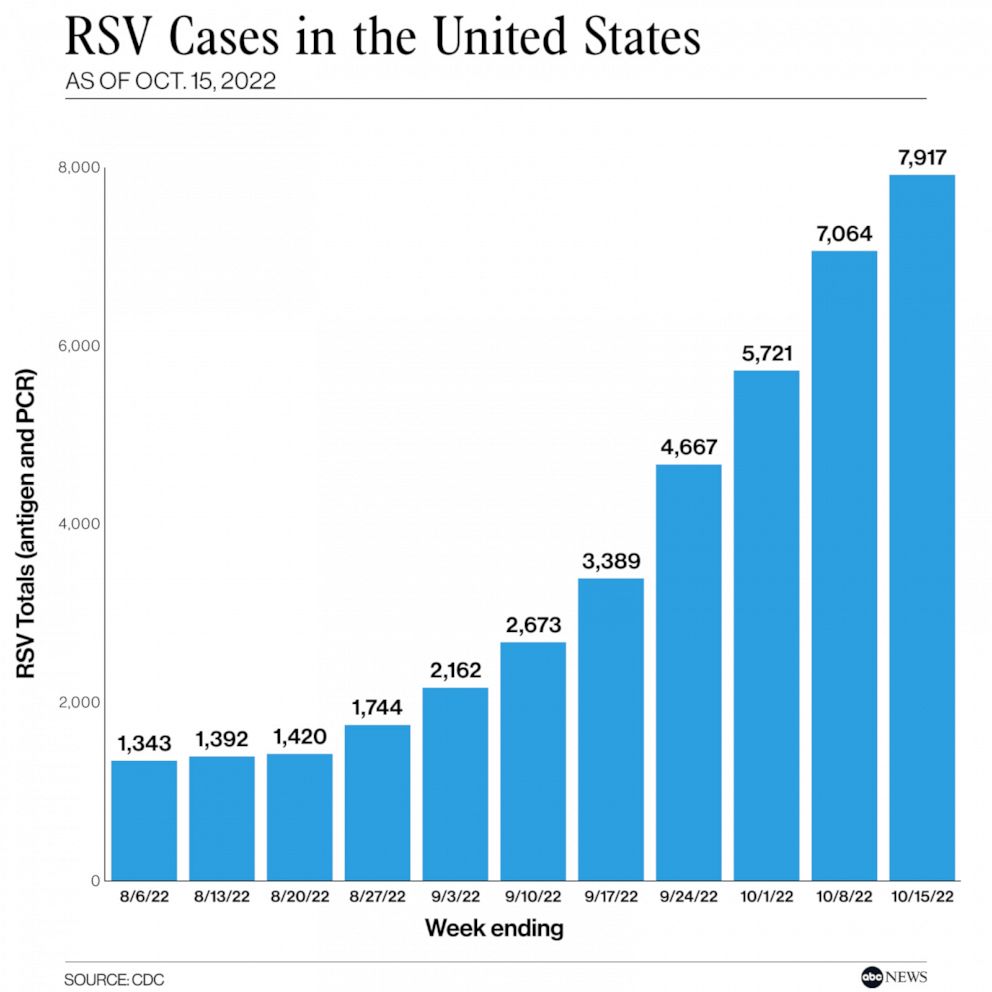Is the US facing a potential 'tripledemic' of flu, RSV and COVID-19?
CDC data shows cases of the flu and RSV are surging earlier than usual.

As summer ended and the United States headed into the fall and winter, doctors were worried Americans would see a "twindemic" -- a situation in which both flu and COVID-19 spread at the same time.
But experts told ABC News the country may now be facing the threat of a "tripledemic" as doctors see an early rise in other pediatric respiratory viruses, particularly respiratory syncytial virus, or RSV.
According to the Centers for Disease Control and Prevention, respiratory illnesses are appearing earlier, and in more people, than in recent years.
The federal health agency says there have also been early increases in flu activity across most of the U.S. with indications that this season could be much more severe than the previous two seasons.
As of Monday afternoon, pediatric bed occupancy in the U.S. is the highest it's been in two years with 75% of the estimated 40,000 beds filled with patients, according to an ABC News analysis.
COVID-19 infections have not yet begun to spike, CDC data shows. But in prior years, the virus has started to pick up around Thanksgiving.
Experts said a combination of waning immunity to COVID and lack of exposure to other viruses, combined with close gatherings indoors, is fueling a "perfect storm."
"Mostly the issue is there's low population immunity and kids are, once again, gathered again, and this is facilitating rapid spread of viruses like RSV," said Dr. John Brownstein, an epidemiologist and chief innovation officer at Boston Children's Hospital and an ABC News contributor. "And because of the sheer volume of infection, when you have that larger denominator, you have a situation where a portion of those kids are going to require hospital treatment. And because of that, our hospitals are spread thin, not only for bed capacity, but also for critical staffing, of those beds."
He added, "So the combination of shortages, bed capacity and rising viral illness all make for an unfortunate perfect storm that we're seeing happen everywhere right now."
MORE | RSV in children: Symptoms, treatment and what parents should know

Resurgence of respiratory viruses
Over the last two years, there were more restrictions such as masking, social distancing, capacity limits and school closures. This meant fewer Americans were exposed to other viruses as well, including the flu and RSV.
Now, with few to no mitigation measures in cities and states across the country, this is leading to a resurgence of these viruses.
"That just leaves a lot of children, young children in particular, that have been born since March of 2020 who haven't yet encountered RSV infections," Dr. Larry Kociolek, medical director of Lurie Children's Hospital in Chicago, told ABC News. "And so that will increase the ability of the virus to spread and increase the number of children who will get infected."
According to the CDC, flu test positivity rates have increased from 1.27% for the week ending Sept. 24 to 4.38% for the week ending Oct. 15, higher than usual for this time of year, experts said.
SEE ALSO: Growing concerns over rising flu cases and when you should get your shot

Brownstein said another challenging issue for hospitals is staffing shortages.
"We have already an overworked and overstressed workforce, you have many that have left the health care industry because of burnout," he said. "And then on top of that, you have infection among health care staff."
Importance of vaccination
The doctors told ABC News it is vital for children to get vaccinated to prevent severe complications. Children can be hospitalized from any of these infections and those with underlying conditions are at the highest risk.
"If your child has not yet received the influenza vaccine, it is imperative that he or she [gets one] as soon as possible," Dr. Federico Laham, medical director of pediatric infectious disease at Orlando Health Arnold Palmer Hospital for Children, told ABC News. "It takes, as we know, a few weeks to mount a response. With some children who, especially after these past two years with very little flu circulation, the immune system gets a little bit lazy and forgetful. So it's important to 'remind' it."
Laham went on, "The same thing applies to COVID vaccine. Some children developed COVID early on in the pandemic and then didn't get the vaccine. We know that it works, we know that it's extremely safe."
In addition, experts say that parents may consider having their children wear masks and make sure they're practicing good hand hygiene, washing hands thoroughly with soap and water.
"The other thing that schools can do, and kids can do, is make sure you bring hand sanitizer with you to school so you can clean your hands and wipes to wipe down surfaces," Dr. Tom Murray, an associate professor of pediatrics in the section of infectious diseases at Yale University School of Medicine, told ABC News. "And again, common touch points, though the wiping down of contaminated surfaces is especially important with viruses like RSV."
ABC News' Eric Strauss contributed to this report.







